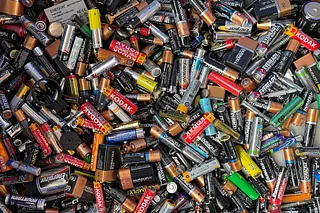Reserve Capacity and the Emerging Competition Over Batteries
An analysis of strategic energy reserves and geopolitics

I promise this isn’t going to be one of those “data is the new oil” posts, but the oil analogy is useful. According to a recent Financial Times article, China is building battery production facilities at a rate that is currently double the estimated demand for gigawatt hours globally. The article cites Chinese government subsidies as a primary enabler of the volume of battery plant construction. A CRU Group study states that China’s battery production capacity is on pace to deliver 1,500 gigawatt hours (GWh) in 2023, which is exceedingly more than the forecast global demand level of 636 GWh. If China alone is producing enough battery production capacity to feed the global demand twice over, what are they really trying to accomplish? Sure, government subsidy money comes easy in China, especially for technology projects, but this is a different level. Looking at the strategic context of Chinese technology policy and other global actions, they are building reserve capacity and with it a major lever in great power competition.
Reserve capacity is a term usually associated with the oil market. In order to control oil prices, oil producing countries must be able to control the supply of oil relative to the demand. This means oil producing countries can either increase the output of oil when demand is high to lower prices or decrease oil output when demand is high to raise prices. The world has seen both strategies. The ability to control output in concert with demand is more complex than it may seem. Right now, countries like Saudi Arabia have entire oil refinery plants that are fully operational that sit idle until they are ordered to start refining. Those idle plants cost money and staff to maintain, but the ability to control prices is worth more than putting money into a plant that is not producing. It’s not just about economics, it’s about geopolitical power. If you own the ability to increase or decrease the flow of oil and impact the price of oil globally nearly by decree, you have immense power and other countries might be more willing to cater to what you want in other areas. Having reserve capacity in the energy sector is a global power.
So, let’s play this out. As far as domestic need, FT reports that China’s production is set to be more than twice what would be required to replace their entire vehicle fleet with electric cars by 2030, no small number. Sure, the global demand for electric cars, and the batteries that run them, is growing, but not at a pace that would justify the surge in investment and rapid increase of battery production currently happening in China. FT goes on to report that there is an estimated 500GWh production gap in Europe that could be filled by Chinese battery production. There is definite economic opportunity in that that gap, and China is almost certainly keen to capitalize on it. However, we can take a lesson from Russia here as we saw what it was able to do with European natural gas dependence. For decades, Russia was able to get Europe to look the other way as it engaged in bad and dangerous behavior until it took the step into Ukrainian territory and out of Europe’s willingness to turn the other cheek. Europe responded, with substantial prodding from the US, by changing its posture toward Russian energy. There was pain involved in that, but Europe was willing to endure and move toward sustainable and renewable energy sources at a faster pace.
To give credit where credit is due, you have to admire the elegance of China’s move to build reserve capacity in battery production. On one hand, they identified economic opportunity in a significant global battery production gap and set themselves up well in advance to answer that need. Chinese companies, and the CCP, stand to make billions on battery sales in the coming decades. On the other hand, China watched what happened to Russia in Ukraine (in more ways than one) and positioned itself strategically to control the market into which Europe is moving in a post-Ukraine invasion world. Now, China has the ability to turn up or turn down the supply of batteries globally and control their price in the same way that OPEC does with oil. This is what the FT article misses. While the economic opportunities to control the market, and to expand are certainly important, those opportunities only represent half of the overall strategic plan. Building reserve capacity in energy production has never been a bad bet and it is an issue the West should be more concerned about.
It’s hard to predict the future, but an assumption that China will still want to reclaim Taiwan is a pretty safe bet. I often hear people talk about how soon China will actually attempt a forceful reunification and hear estimates ranging from “this year” to no more than 2 years. I disagree with these timelines because China thinks longer and more strategically than that. Reserve capacity in battery production makes that point because it is giving the Chinese a second global lever to pull should they make the decision to retake Taiwan.
In this scenario, let’s say that China’s reserve capacity is at least as high as the FT article claims. China would likely give the global economy something like two years to ensure it is dependent on Chinese capacity and to ensure that the changes in battery production levels will impact the global prices as intended. The demand for an overall market saturation of electric vehicles will be higher after two years making the expected global economic impact higher than it is today. If China were to undertake a forceful reunification of Taiwan, it would be able to threaten the global economy in two important ways.
- Semiconductors: TSMC is a strategically important piece of semiconductor production capacity that China desperately wants to control. If China invaded or otherwise claimed ownership of Taiwan, TSMC would be held as ransom. If any country interferes with Chinese plans, China could shutter TSMC or worse. That kind of move would have immediate impacts on the global economy and would be a deterrent to intervention.
- Batteries: In the same way, China could threaten to decrease or shut off its production and export of batteries as a second deterrent. Would Europe be willing to go through another energy realignment resulting from a conflict thousands of miles away? China’s desire to fill Europe’s battery production gaps suggests it would not. If China can use technology to drive wedges in global alliances and sanctions participants, it has done its job.
The fact that China identified a global market gap in battery production and subsequently the CCP is subsidizing a technology production project comes as a surprise to no one. What is noteworthy about the FT reporting is that China is building a strategically important reserve energy production capacity that it will almost certainly use as an instrument of state power to pursue its long-term goals. It has a strategy to address a market, create dependence, and control production and prices while taking lessons from Russia’s adventurism. That’s the problem, but what’s the solution?
The solution is not easy because the West and China are not playing the same game. CCP is willing to take economic losses to subsidize an economic project that it will use as an instrument of state power years in the future. The West is not structured this way so racing China in a capacity building exercise is futile. The bigger worry is that the West did not see this coming. The priorities for the US and its allies were elsewhere while China was building up it production infrastructure, similar to when China was busy building 5G. The US will need to increase its battery production capacity along with its ability to domestically manufacture chips, but the bigger issue is one of expertise and priorities. The US and the West need to see the world through an emerging technology lens the same way that China has for decades. It needs people who are experts in emerging technology the same way that it has experts in cybersecurity. We need to spend time and resources educating and growing these professionals so that they can see strategic value like this in coming technologies. Those people need to be given the resources to do their job and that means prioritizing emerging technology topics.
One of the advantages of an autocracy is that you can just do things. You want to spend billions on reserve battery production capacity, no problem. No Congress, no election, just do it. The US and the West have chosen not to live in that society and should be proud of that. Our approach to strategic challenges like this will be different. We will build some of our own capacity, but we are unlikely to unilaterally build at this scale absent a clear economic demand and favorable profit margins. That means we have to think more creatively and more strategically and that requires a clear recognition of the strategic value of emerging technologies before they are in ubiquitous use. Chinese control of potentially two technology choke-points could be decisive and we need to work to counter it in a way that is consistent with our values and builds alliances and partnerships globally.
One suggestion would be to use the international technology standards making process to control China’s ability to dominate the market. It is possible to use standards making strategically in order to force China into a position where it must comply or not compete. The same could be done for international standards for batteries to ensure that Chinese batteries perform to a certain level, have a certain life span, and that supply chains are controlled in certain ways. This could be a powerful lever and building an alliance around a shared priority could be our best card to play.

